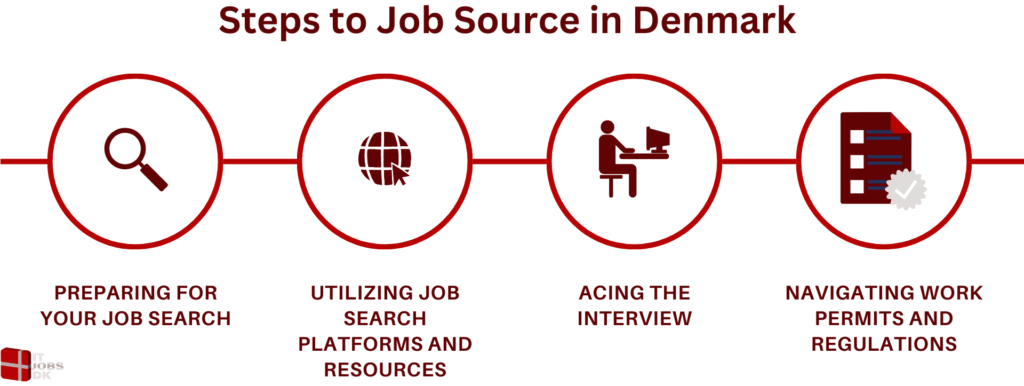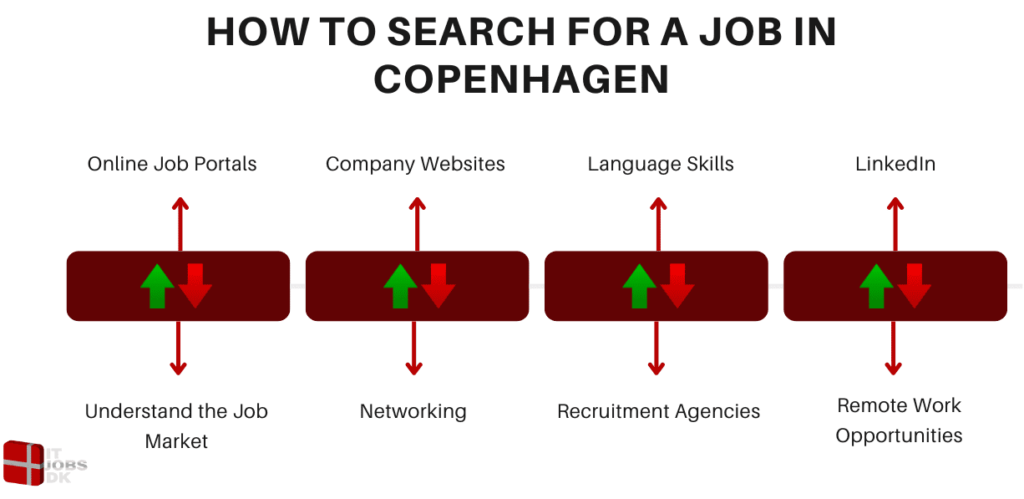
The Danish job market is evolving rapidly, driven by technological advancements and shifting business priorities. IT jobs in Denmark are particularly in high demand as companies invest in digital transformation to stay competitive. This demand is reflected in the need for professionals skilled in areas such as data analysis, cybersecurity, software development, and cloud computing.
According to the International Labour Organization’s report, the global employment scenario is complex, with a slight increase in global unemployment expected in 2024. However, Denmark has shown resilience, with a strong focus on skilled talent to drive economic recovery and growth.
Job search Denmark has become more competitive, especially in the IT sector. Companies are not only looking for technical skills but also value soft skills like problem-solving, communication, and teamwork. The World Economic Forum’s report highlights that employers expect a high churn in job roles due to technological advancements, with a significant focus on roles related to AI, machine learning, and information security.
Steps to Job Source in Denmark
Preparing for Your Job Search
Embarking on a job search requires a strategic approach to ensure success. Here are some key steps on how to job search effectively plan:
- Self-Assessment: Start by evaluating your skills, interests, and career goals. Understand what you bring to the table and what type of roles you are aiming for. This will help you target your job search more effectively.
- Research: Gather information about potential employers and industries that align with your career aspirations. Look into the company culture, job requirements, and growth opportunities. Utilize resources like company websites, LinkedIn, and job boards.
- Resume and Cover Letter: Craft a compelling resume and cover letter tailored to each job application. Highlight your relevant skills and experiences, and ensure your documents are error-free and professionally formatted.
- Networking: Leverage your professional network to uncover job opportunities. Attend industry events, join professional associations, and connect with alumni and colleagues. Networking can often lead to job leads that are not advertised publicly.
- Online Presence: Ensure your LinkedIn profile is up-to-date and reflects your professional brand. Engage in relevant online communities and share content that showcases your expertise. A strong online presence can attract recruiters and hiring managers.
- Job Applications: Apply strategically by focusing on roles that match your skills and career goals. Customize your applications for each position to demonstrate your genuine interest and fit for the role.
- Interview Preparation: Prepare for interviews by practicing common questions, researching the company, and preparing your own questions for the interviewer. Mock interviews with a friend or mentor can be helpful.
- Follow-Up: After interviews, send a thank-you note to express your appreciation and reiterate your interest in the position. This can help you stand out from other candidates.
By following these steps and staying proactive, you can navigate your job search more effectively and increase your chances of landing the ideal role.
Utilizing Job Search Platforms and Resources
When searching for a job in Denmark, leveraging the right platforms and resources can significantly boost your chances of success. Here are some effective ways to utilize job search websites Denmark:
- Local Job Portals: Platforms like Jobindex and Workindenmark are highly popular for job seekers in Denmark. These sites offer a wide range of job listings across various industries and allow you to filter searches based on your preferences and qualifications.
- International Job Boards: Websites such as LinkedIn, Indeed, and Glassdoor also feature extensive listings for job search in Denmark. These platforms can be particularly useful for finding roles in multinational companies or positions that require English proficiency.
- Company Career Pages: Many companies in Denmark post job openings directly on their websites. Regularly check the career sections of companies you are interested in to stay updated on new opportunities.
- Recruitment Agencies: Agencies like Adecco, Hays, and Michael Page have a strong presence in Denmark and can provide personalized assistance in your job search. They often have exclusive listings and can match you with roles that fit your skills and experience.
- Networking: Utilize professional networking platforms like LinkedIn to connect with industry professionals and join relevant groups. Networking can uncover job opportunities that are not advertised publicly and provide valuable insights into the job market.
- Social Media: Follow companies and job boards on social media platforms like Facebook, Twitter, and LinkedIn. Many organizations post job openings and career events on their social media channels.
- Remote Job Boards: For those interested in remote work opportunities, websites like Remote.co, We Work Remotely, and FlexJobs list remote positions that are open to candidates in Denmark. These platforms can be a great resource for finding flexible job options.
- University Career Services: If you are a recent graduate or a student, take advantage of your university’s career services. They often have job listings, career fairs, and resources to help you prepare for the job market.
By effectively utilizing these job search websites in Denmark and other resources, you can streamline your job search in Denmark and find the right opportunities more efficiently.
Acing the Interview
Securing an interview is a significant milestone in your Denmark job search, but acing it requires careful preparation and practice. Here are some key strategies to help you shine during your interview:
- Research the Company: Before the interview, thoroughly research the company. Understand its mission, values, products, services, and recent news. This knowledge will help you tailor your responses and show that you are genuinely interested in the company.
- Understand the Role: Carefully review the job description and align your skills and experiences with the requirements of the position. Be ready to discuss how your background makes you a perfect fit for the role.
- Practice Common Questions: Prepare answers for common interview questions, such as “Tell me about yourself,” “What are your strengths and weaknesses?” and “Why do you want to work here?” Practice your responses to ensure they are concise and relevant.
- Prepare Questions: Have a list of thoughtful questions to ask the interviewer. This demonstrates your interest in the role and helps you gather information to determine if the company is the right fit for you.
- Highlight Your Achievements: Be ready to discuss specific examples of your past achievements. Use the STAR method (Situation, Task, Action, Result) to structure your answers and provide clear, concise stories that showcase your skills and accomplishments.
- Cultural Fit: Danish workplaces often value teamwork, flat hierarchies, and work-life balance. Show that you understand and appreciate these cultural aspects, and be ready to discuss how you would fit into the company’s culture.
- Body Language: Pay attention to your body language during the interview. Maintain good eye contact, sit up straight, and offer a firm handshake. Positive body language can convey confidence and enthusiasm.
- Follow Up: After the interview, send a thank-you email to express your appreciation for the opportunity and reiterate your interest in the position. This can leave a positive impression and keep you top of mind.
By following these strategies, you can increase your chances of acing the interview and securing the job.
Navigating Work Permits and Regulations
Securing a work permit is a crucial step in your Denmark job search visa process. Here’s a brief guide:
- Understand the Types of Visas: Denmark offers several types of work permits, including the Positive List scheme for highly skilled professionals and the Pay Limit scheme for high-earning professionals. Make sure to identify which visa category you fall under.
- Application Process: The application for a work permit typically involves submitting proof of employment, educational qualifications, and a valid job offer from a Danish employer. You can apply online through the official Danish Immigration Service portal.
- Documentation: Gather all necessary documents, including your passport, job contract, proof of educational qualifications, and any other supporting documents required for your specific visa category.
- Processing Time: The processing time for a work permit can vary, so it’s advisable to apply well in advance of your intended start date. Generally, it can take a few weeks to a couple of months.
- Stay Updated: Regulations and requirements can change, so regularly check the official New to Denmark website for the latest information and updates on work permits and visas.

How to Search for a Job in Copenhagen
Searching for a job in Copenhagen involves understanding the local job market and utilizing effective strategies. Here’s a guide to help you get started on your job search Copenhagen:
- Understand the Job Market: Copenhagen is a hub for various industries, especially in technology, finance, and life sciences. The city also has a growing demand for hiring remote software developers, as more companies are adopting flexible working models. Research the sectors that align with your skills and career goals.
- Online Job Portals: Utilize Danish job portals such as Jobindex, Workindenmark, and Graduateland. These platforms list numerous job opportunities in Copenhagen and across Denmark. International platforms like LinkedIn, Indeed, and Glassdoor also have extensive listings for the region.
- Networking: Leverage your network by connecting with professionals in your field. Attend industry events, join local professional groups, and participate in meetups. Networking can open doors to job opportunities that are not advertised publicly.
- Company Websites: Many companies list job openings directly on their websites. Identify companies you are interested in and regularly check their career pages. This is particularly useful for tech companies looking to hire remote software developers.
- Recruitment Agencies: Consider registering with recruitment agencies that specialize in your field. Agencies like Adecco, Hays, and Michael Page have offices in Copenhagen and can provide personalized job search support.
- Language Skills: While many jobs in Copenhagen require proficiency in Danish, there are also opportunities for English speakers, especially in tech and multinational companies. Highlight your language skills appropriately on your resume and cover letter.
- LinkedIn: Ensure your LinkedIn profile is up-to-date and optimized for job search. Connect with recruiters and join LinkedIn groups related to your industry. Posting and engaging with content relevant to your field can increase your visibility to potential employers.
- Remote Work Opportunities: With the rise of remote work, many companies in Copenhagen are open to hiring remote software developers. Explore remote job boards such as Remote.co, We Work Remotely, and FlexJobs to find opportunities that allow you to work from anywhere.
By following these strategies and staying proactive, you can enhance your job search in Copenhagen and increase your chances of finding the right job.

Staying Motivated and Positive: Managing Job Search Stress
The job search process can be challenging and stressful, but staying motivated and positive is key to success. Here are some strategies to help manage stress during your job search:
- Set Realistic Goals: Break down your job search into manageable tasks. Set daily or weekly goals, such as updating your resume, applying to a certain number of jobs, or networking with industry professionals. Achieving these smaller goals can give you a sense of accomplishment and keep you motivated.
- Maintain a Routine: Treat your job search like a job. Create a daily schedule that includes time for job applications, skill development, networking, and breaks. A structured routine can help you stay focused and productive.
- Take Care of Yourself: Prioritize your physical and mental well-being. Exercise regularly, eat healthily, and get enough sleep. Practice relaxation techniques like meditation or yoga to reduce stress and improve your overall mood.
- Stay Connected: Reach out to friends, family, and peers for support. Sharing your experiences and feelings with others can provide emotional relief and help you stay positive. Networking can also lead to job opportunities and valuable advice.
- Learn and Grow: Use this time to develop new skills or improve existing ones. Online courses, webinars, and workshops can enhance your qualifications and make you more competitive in the job market. Continuous learning can also keep your mind engaged and reduce anxiety.
- Celebrate Small Wins: Acknowledge and celebrate your progress, no matter how small. Completing an application, getting a callback, or learning a new skill are all achievements worth recognizing. Celebrating these milestones can boost your confidence and motivation.
- Seek Professional Help if Needed: If job search stress becomes overwhelming, consider seeking help from a career counselor or mental health professional. They can provide personalized advice and strategies to manage stress effectively.
By implementing these strategies, you can maintain a positive outlook and manage stress during your job search. Remember, persistence and resilience are crucial, and every step you take brings you closer to your goal.
Take the Next Step in Your Denmark Job Search Today
Navigating the Danish job market can be challenging, but with the right strategies and resources, you can find the perfect opportunity that aligns with your skills and career aspirations. Start your journey by leveraging local job portals, networking with industry professionals, and preparing thoroughly for interviews.


 Previous Post
Previous Post Next Post
Next Post